Ferris Bueller At 30: American Hero, Or Psychotic Super-Villain?
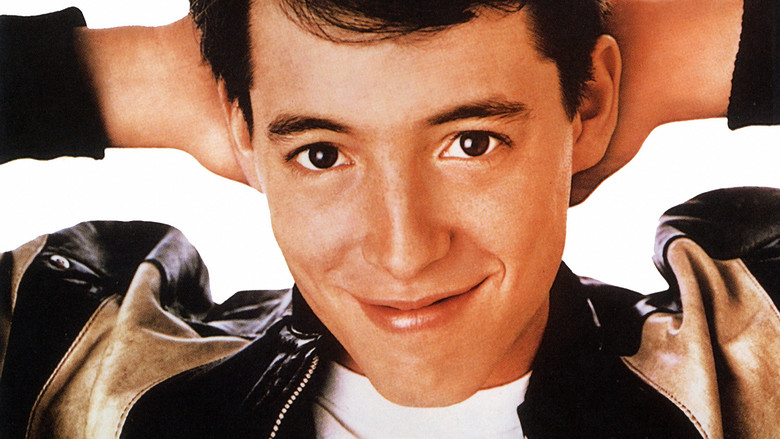
11 June 1986 saw the cinema release of ‘Ferris Bueller’s Day Off,’ and 30 years on it’s still one of the best-loved comedies of its decade.
‘Ferris Bueller’ was the fourth film from writer-director John Hughes, following on from 1984′s ‘16 Candles,’ and 1985′s ‘The Breakfast Club’ and ‘Weird Science,’ and it marked the culmination of the 80s icon’s run of teen-oriented comedy hits. (Hughes also wrote but didn’t direct ‘Pretty in Pink’ and ‘Some Kind of Wonderful.’)
Whilst all Hughes’ teen comedies remain popular today, there’s a particular fascination with ‘Ferris Bueller.’ This would seem to be primarily down to the title character himself, memorably performed by a near-constantly fourth-wall breaking Matthew Broderick.
By contrast with most Hughes protagonists who tend to be riddled with adolescent insecurity, Ferris is an inexhaustible well of free-spirited self-belief: handsome, popular, charismatic, persuasive, and steadfast in his refusal to be broken down, all of which he relays to the audience through frequent monologues delivered directly to the camera.
Audiences were clearly receptive to his message, as the film wound up an enduring hit. However, many more recent reappraisals of ‘Ferris Bueller’s Day Off’ have noted a somewhat sinister element to Ferris: how his irrepressible over-confidence and lack of regard for others indicate that he just might be a psychopath - or, at the very least, a complete jerk.
So in honour of the movie’s 30th anniversary, let’s weigh up the evidence for either side of the argument: is Ferris Bueller a hero or a villain?
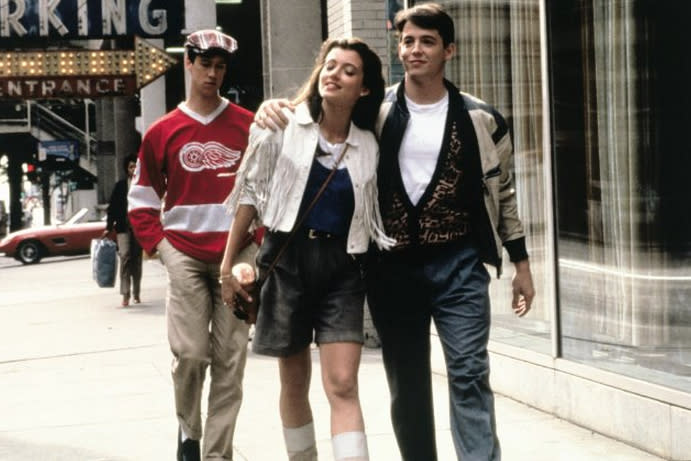
Ferris Bueller’s Heroic Traits
As we’ve established, the lead characters from any other John Hughes teen movie you could name tend to be the social outcasts: sensitive, put-upon intellectuals who feel alienated both at school and at home.
While comparable in wit and intellect, Ferris Bueller is miles removed from these other Hughes heroes in temperament. Well-spoken, well-read, well-dressed (and, not for nothing, wealthy), Ferris certainly has his geeky qualities, but he owns these in such a way that it all comes off as pure charisma.
This, we’re told, grants Ferris tremendous popularity among his peers: as Edie McClurg’s Grace memorably informs us, “the sportos, the motorheads, geeks, sluts, bloods, wastoids, dweebies, d*ckheads - they all adore him. They think he’s a righteous dude.”
This ability to charm the pants off just about anyone and everyone means that Ferris is able to get away with whatever he wants. As such, he slyly thumbs his nose at adult authority left and right, notably Jeffrey Jones’s school principal Mr Rooney, who is seemingly the only one immune to Ferris’s charm along with his sister Jean, played by Jennifer Grey. Sticking it to the man in this fashion is something which all young people long to do deep down.
Where other Hughes protagonists reflect the angst that so many teenagers struggle with, Ferris presents those same teens with a figure to aspire to. Ferris doesn’t make concessions for anyone; he is who he is, makes no apologies for it, and his appreciation of life is all the better for it.
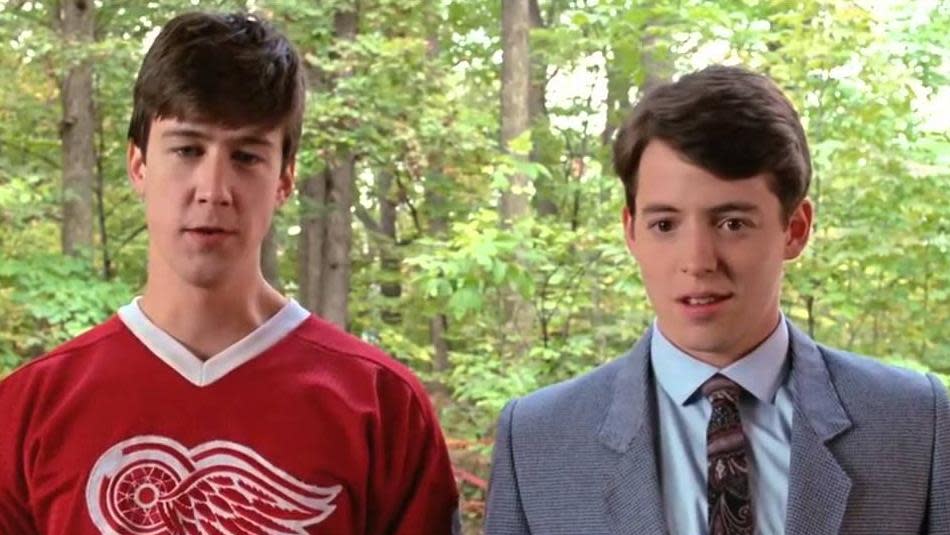
His friendship with Alan Ruck’s Cameron highlights this. Awkward, timid and depressive, Cameron is far closer to other Hughes protagonists than Ferris - and it has often been argued that he is the true protagonist of the film. One oft-cited fan theory posits that the film is a ‘Fight Club’ prequel and Ferris is entirely a figment of Cameron’s imagination, but let’s sidestep that for now (read more about that theory here).
Ferris himself more than once declares the whole impetus behind the day off is to indulge not himself, but Cameron. With high school approaching its end and college looming, Ferris knows the two lifelong friends will soon be separated, perhaps for good. The same is also true of his girlfriend Sloane (Mia Sara), and that’s a sad prospect that most teenagers must eventually face.
The key thing is, while there is an element of ‘last hurrah’ to the day off, Ferris never allows things to get maudlin. His focus is entirely on the moment, and making the most of it; a philosophy immortalised in arguably his most celebrated line, “life moves pretty fast; if you don’t stop and look around once in a while, you could miss it.”
There’s a lot to be said for this carpe diem attitude, and it proves infectious; so infectious that Ferris is able to lead basically the whole city of Chicago in an impromptu chorus of Twist and Shout.
All this considered, how could Ferris be anything but 100% pure good guy? Well…
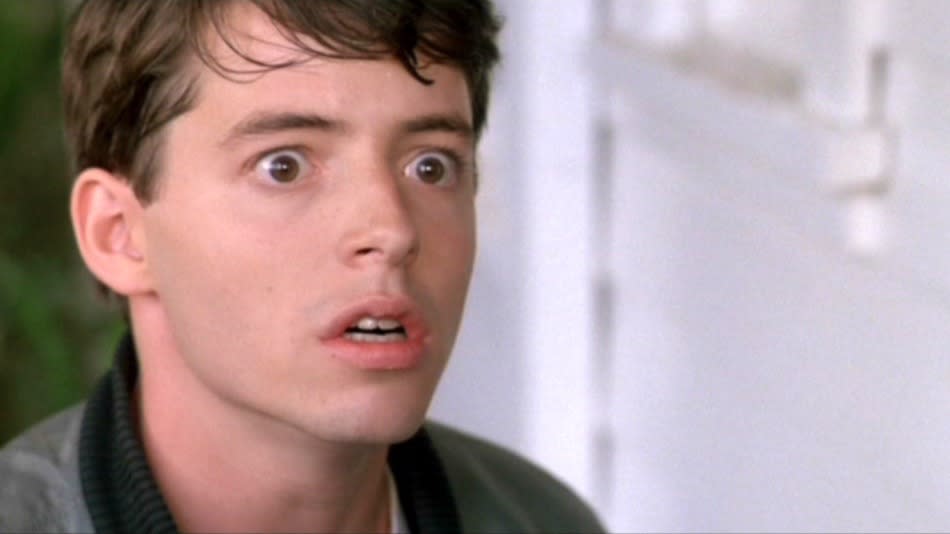
Ferris Bueller’s Villainous Traits
Consider the film’s opening scene. Ferris lies in bed feigning illness, drawing real concern from his clearly loving and doting parents, with whom he exchanges seemingly genuine displays of affection – then the second he hears the front door slam, he sneers into the camera, “they bought it.”
Are these the actions of a cheeky young scamp with a healthy sense of rebellion – or the heartless manipulations of an unfeeling egomaniac?
Witness the shower room monologue that follows, as Ferris dismisses the importance of learning about European socialism at school, as it has no bearing on the fact that he doesn’t own a car. Right from the get-go his extreme self-interest is irrefutable – and made all the more repugnant given how immediately apparent it is that he lives a tremendously affluent lifestyle.
We soon thereafter learn that Ferris has pulled this same routine 9 times already without his parents’ knowledge, which makes it clear this kind of bald-faced deception is typical behaviour for the young miscreant.
Such lies continue to spill from his lips throughout, from insisting to the restaurant’s head waiter that he’s the Chicago sausage king Abe Froman, to convincing his buddy Cameron that they can easily reset the mileage on his father’s treasured vintage Ferrari.

Oh yes, Ferris’s cruel and deceitful nature extends to his treatment of his supposed best friend. Not only does he force Cameron to join in his day of truancy when he knows very well his friend is off school due to illness, he also nags him into essentially stealing his father’s car in the full knowledge that his father will find out about it afterwards.
Perhaps we could look upon this as Ferris being cruel to be kind, trying to push his friend out of his comfort zone – but on the other hand, much of it seems an awful lot like bullying.
And just look at how unhinged Ferris gets in moments when he doesn’t get his way. See how furious he is when Sloane says she doesn’t want to marry him; or how, when both Sloane and Cameron tell him he’s going too far in his deception at the restaurant, he grimaces into the camera, “you can never go too far.”
Most frustratingly, Ferris never faces any consequences for his actions, and come the final reel there’s no sense that he has learned any life lessons of any sort.
And it’s hard to avoid the sense that, if one person during the oh-so important day off didn’t winding up letting Ferris get what he wanted, our ‘hero’ might easily have snapped and gone full-on Patrick Bateman.
For a more thorough examination of how Ferris might be deemed a psychopath, read this.
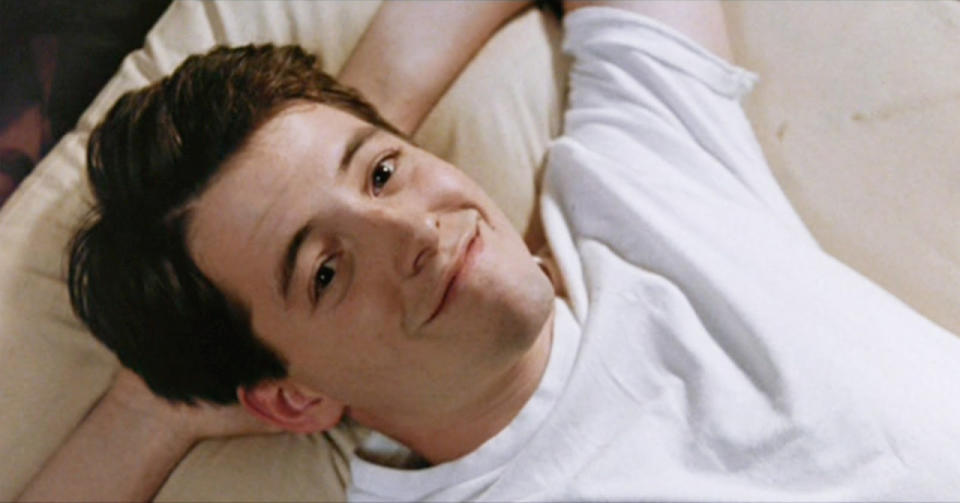
Still – even if Ferris is a pretty despicable human being, does this make it any less appropriate for us to enjoy watching his adventures? Remember, he’s a product of the 1980s; the decade that made poster children of Freddy Krueger and Rambo. Dangerously unhinged people were all the rage.
Perhaps the most appropriate label for Ferris is that of the anti-hero. He behaves in a manner in which any sensible human being knows they cannot and must not in daily life – but there’s also no denying that, on some level, we all fantasise about doing the things he does from time to time. For this reason, it’s entirely fitting that ‘Deadpool’ pays homage to the character.
So, Ferris Bueller may not be the most admirable human being, and he does plenty which would be worth of contempt in real life, it’s still hard not to cheer him on just a little. Yes, he’s a self-obsessed little psycho - but in so being, he resonates with the self-obsessed psycho that lives within us all.
Picture Credit: Paramount
Read More:
Deadpool/Ferris Bueller Mash-Up Trailer
Head: The Mad Movie That Destroyed The Monkees
Rik Mayall’s Lost Potter Role

 Yahoo Movies
Yahoo Movies 
